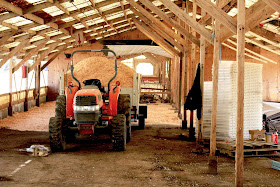Where
there are ducks, geese, and other poultry, ammonia gas will be
produced and can be harmful to a flock. It is impossible to avoid the
production of ammonia, but the harm of concentrated ammonia can be
mitigated if preventative measures are taken.
Ammonia gas is produced by the breakdown of uric acid in poultry droppings by bacteria in the litter. When wet, the ammonia production is accelerated and is especially prominent in coops where there is a high percentage of manure in the bedding.
According
to the Occupational Health and Safety Administration, people can
start to smell ammonia between 5 and 50 parts per million (ppm)
depending on how well they can smell. Anything above 25 ppm and the
ammonia is now in danger of damaging your bird’s health.
Therefore, ammonia can be harming your birds and you don’t even
notice it!
Ammonia gas is acidic and can cause serious damage not just to your birds' throat, lungs, and eyes, but your own as well. Ammonia has been known to cause blindness, damage to the esophagus, and death via suffocation. A safe rule is that if you can smell it, you need to do something about it because 1) your birds are breathing that ammonia 24/7 and 2) put your nose 6” above the litter where your birds are. Notice how much stronger it is? A good rule of thumb is if you can stay in the coop while reading a book for an hour with no discomfort, then your birds have a great environment.
You
may be thinking, “But I clean my coop every day!”. If you have a
small flock, that's great and you should never have an ammonia
problem. However, if you don’t have time for this (and we don’t
necessarily recommend
cleaning every day as the build up of litter allows moisture to
travel down through the bedding and away from the surface and reduces
total bedding use) there are other very effective ways of controlling
the ammonia.
The
best thing you can do is make sure that your coop is well ventilated.
Many people, especially during winter, like to make their coops
airtight in order to keep their birds warmer and to prevent predators
from entering, but this can be detrimental to your flock. Openings
can instead be covered with hardware cloth or chicken wire which will
allow fresh air into the coop. Typically there are more problems
caused by lack of ventilation than too much ventilation. Remember –
your ducks and geese are designed to swim very comfortably in ice
cold water. If you have snow, they will probably prefer to be
outside than inside. So provide plenty of ventilation! They can
handle it!
If
you are raising young birds in cold weather and have to limit your
ventilation since your heater cannot keep up with the incoming cold
air, there are many products to help neutralize existing ammonia that
can be sprinkled on the bedding such as DooKashi, Fresh Coop, and
CHICK Flic Odor Eliminator. Products such as these can be found at
your local feed or pet store. We personally like to sprinkle iron
sulfate in our bedding if we have a problem. It is a commercially
available granular fertilizer that neutralizes the ammonia and makes
your bedding even more valuable as a fertilizer for your garden!







No comments:
Post a Comment